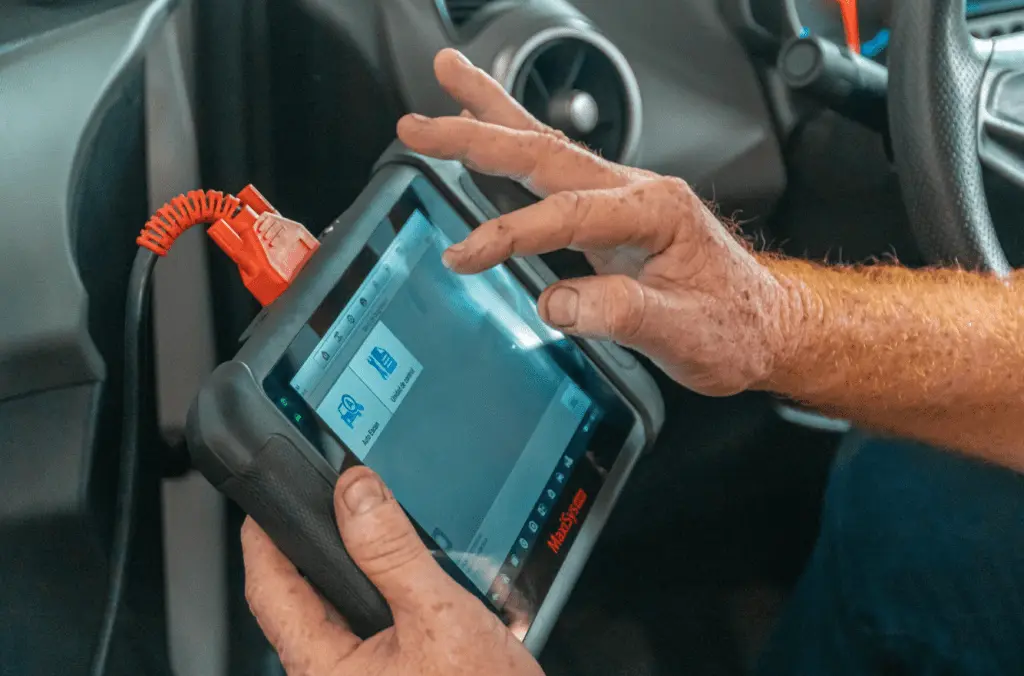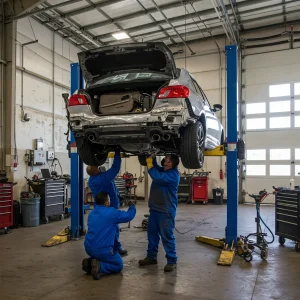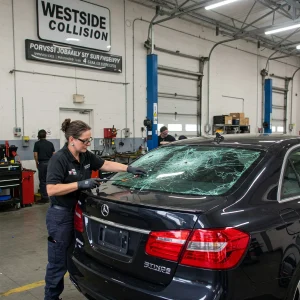Diagnostic testing for cars are essential for identifying internal issues that may not be visible during a regular inspection. Whether you’re dealing with a check engine light or a mysterious noise, this type of testing can reveal what’s really going on under the hood. Understanding how car diagnostics work and knowing where to find reliable, affordable services—car diagnostic test online, nearby, or even at home—can save you time, stress, and unnecessary repairs.
Car Diagnostic Services
diagnostic testing for cars help detect problems related to your engine, transmission, exhaust system, and more. Whether through an online test or an in-shop inspection, these services provide crucial insights that can prevent major issues. Today, many providers even offer same day diagnostic testing for cars, especially for urgent concerns.
How a Car Diagnostic Test Works
diagnostic testing for cars begin by connecting a diagnostic tool to your car’s onboard computer system to scan for error codes. These codes point to issues in specific components—from engine misfires to sensor failures. Some advanced scanners even offer real-time performance data.
There are generally two options for accessing this service
At-home or mobile diagnostic testing
This option offers convenience by bringing diagnostic tools directly to your location, ideal for busy schedules or non-drivable vehicles.
In-shop professional diagnostic testing
Conducted in a fully equipped repair facility, this method provides access to advanced diagnostic equipment and on-the-spot repairs if needed.
In either case, the process is usually straightforward and doesn’t take long.
Diagnostic Testing for Cars
diagnostic testing for cars help uncover issues you might not notice during daily driving. For example, electrical diagnostic testing for cars near me can pinpoint hidden faults in your vehicle’s wiring or electronic components.
Such tests are particularly valuable in the following situations:
- When buying a used car
- Before long-distance trips
- During routine maintenance checks
diagnostic testing for cars help uncover issues you might not notice during daily driving. For example, diagnostic test for cars prices may vary, but the value lies in detecting hidden faults in your vehicle’s during Car repair wiring or electronic components.
How Much Should I Pay for a Car Diagnostic?
Prices for diagnostic testing for cars can vary depending on your location, the type of vehicle, and the depth of the test.
Typical price ranges:
- Basic diagnostic test: $50–$100
- In-depth or specialty testing: $100–$200+
- At-home or mobile service: May include an additional fee
If you’re on a tight budget, look for cheap car diagnostic test near me options, including promotions or first-time discounts.
for diagnostic testing for cars contact us now

How Long Does a Car Inspection Take?
The duration of a diagnostic inspection depends on the issue’s complexity:
- Basic tests: 30 minutes to 1 hour
- Advanced system-specific tests: 1–2 hours
- Some locations offer same-day diagnostic testing for cars
Booking during off-peak hours can help reduce waiting time.
What Parts of a Car Are Tested?
A standard diagnostic testing for cars test can evaluate several systems, including:
Engine and transmission
These are the heart of your vehicle’s performance. Diagnostic tests can reveal misfires, gear shifting issues, or overheating problems.
Battery and charging system
Ensures your car starts reliably and powers electronic components. Testing can detect weak batteries or failing alternators.
ABS and braking system
Keeps your braking safe and responsive. Diagnostics can uncover worn brake pads, sensor faults, or fluid pressure issues.
Car Vibrates at Certain Speeds
One common issue drivers report is that the car vibrates at certain speeds, which can be an early sign of unbalanced wheels, worn engine mounts, or drivetrain irregularities. During diagnostic testing, this symptom is often traced back to underlying mechanical faults that might otherwise go unnoticed
Exhaust and emissions system
Manages pollution and engine efficiency. Tests can detect leaks, faulty oxygen sensors, or emission control failures.
Electrical wiring and modules
Connects all your car’s systems. Diagnostics help identify shorts, faulty connections, or malfunctioning control modules.
Air conditioning and fuel systems
Responsible for comfort and fuel delivery. Tests can find refrigerant leaks or clogged fuel injectors.
Sensors and control modules
These monitor and manage everything from airflow to engine temperature. Faulty sensors can lead to incorrect data and poor performance.
Some advanced tests also check tire pressure sensors and other high-tech features.
These ensure real-time feedback for driver safety and efficiency. Failures here may trigger dashboard warnings or affect stability systems.

Car Repair Services: Importance of Professional Maintenance and Repair
DIY vs. Professional Diagnostic Testing for Cars: Pros and Cons
You can use an OBD-II scanner at home or rely on professional services. Here’s a comparison:
DIY Testing
- Cost-effective: Saves money in the long run by avoiding repeated mechanic visits.
- Portable and reusable: Easy to carry and can be used multiple times on different vehicles.
- Good for basic error code reading: Suitable for identifying simple engine or emission-related issues.
Professional Testing
- Offers comprehensive system analysis: Provides a full check-up of all vehicle systems, including complex ones.
- Includes real-time data and expert advice: Gives you live data along with insights from experienced technicians.
- May come with repair recommendations: Often followed by accurate repair suggestions tailored to the issue.
For complex issues, especially involving electrical or integrated systems, diagnostic testing for cars from a professional are highly recommended.
Top Tools for Diagnostic Testing for Cars
Modern diagnostic testing for cars depend on a range of tools, including:
- OBD-II Scanners: Basic code readers used at home and in shops
- Bidirectional Scanners: Allow control over vehicle functions during tests
- Oscilloscopes: Measure voltage and signal fluctuations
- OEM-Specific Software: Tailored diagnostics for specific car brands
These tools ensure accurate results and smarter repairs.
Common Issues Identified Through Diagnostic Testing for Cars
Using diagnostic testing for cars, mechanics can detect a wide array of problems, such as:
- Misfiring engines
A misfire can cause rough idling, reduced fuel efficiency, and engine shaking. Diagnostics pinpoint whether it’s due to spark plugs, ignition coils, or fuel issues. - Faulty oxygen sensors
These sensors monitor exhaust gases and help regulate fuel mixture. When faulty, they can lead to poor fuel economy and increased emissions. - Car leaking
Whether it’s oil, coolant, or transmission fluid, car leaking can signal worn gaskets, cracked hoses, or failing seals. Diagnostics help locate the exact source before major damage occurs. - Transmission slipping
If your vehicle struggles to shift gears or loses acceleration, it may be due to worn clutches or low fluid levels—easily flagged by transmission diagnostics. - Failing catalytic converters
A clogged or failing converter reduces engine performance and increases pollution. Diagnostic codes often reveal inefficiencies in the exhaust flow. - Airbag malfunctions
Airbag system faults can compromise passenger safety. Scans identify sensor failures or module issues that require immediate attention. - Poor battery performance
A weak or dying battery can cause startup issues or affect electronic systems. Battery diagnostics test voltage, charge retention, and overall health. - Fuel system issues
Clogged injectors, faulty pumps, or pressure loss in the fuel line can cause hesitation and stalling. Diagnostic tests isolate the root cause for targeted repairs.
Early detection helps reduce breakdown risk and prevents expensive repairs
Timely diagnostics not only fix current problems but also prevent future ones, saving money and ensuring safe driving conditions.
.
The Evolution of Diagnostic Testing for Cars: From OBD-I to OBD-II
diagnostic testing for cars have advanced greatly over the years:
- OBD-I (pre-1996): Manufacturer-specific, limited data
- OBD-II (1996–present): Standardized codes and real-time data
- Modern tech: Wireless diagnostics, smartphone integration, cloud-based reports
This evolution has made diagnostics more accessible, accurate, and user-friendly.
Where Can I Get a Diagnostic Test on My Car?
There are multiple access points for diagnostic testing for cars, such as:
Authorized dealerships – Ideal for newer vehicles still under warranty.
Independent auto repair shops – Often more affordable with personalized service.
Mobile diagnostic providers – Come to your location for maximum convenience.
Online booking platforms – Let you compare options and schedule quickly.
Choose based on convenience, budget, and urgency. Some providers even offer car diagnostic test at home. along with services like Car Scratch Repair in Houston to save you time and ensure your vehicle gets comprehensive care.
What Do I Get for My Diagnostic Fee?
When you pay for diagnostic testing for cars, you’re getting more than just a scan:
- Detailed error code report – Provides a clear breakdown of the specific issues detected in your vehicle.
Analysis of affected vehicle systems – Includes a detailed examination of all systems related to the error codes for a better understanding of the problem.
Expert recommendations for repair or maintenance – Offers professional advice on how to address the issues and prevent future problems.
Digital summary for future reference – Gives you a convenient record of the diagnostic results for easy access in the future.
In some cases, an estimate of repair costs – Provides a rough cost estimate, helping you plan for necessary repairs..
It’s an investment in your vehicle’s safety and longevity.
Conclusion
diagnostic testing for cars play a vital role in vehicle maintenance and performance. Whether done at home, in a shop, or online, these services help you detect issues early, reduce repair costs, and ensure your car stays roadworthy. Regular diagnostics also contribute to improved fuel efficiency and overall vehicle longevity. Don’t wait for a major breakdown—book a diagnostic test and stay ahead of problems with confidence.
call us at (713)243-3535





